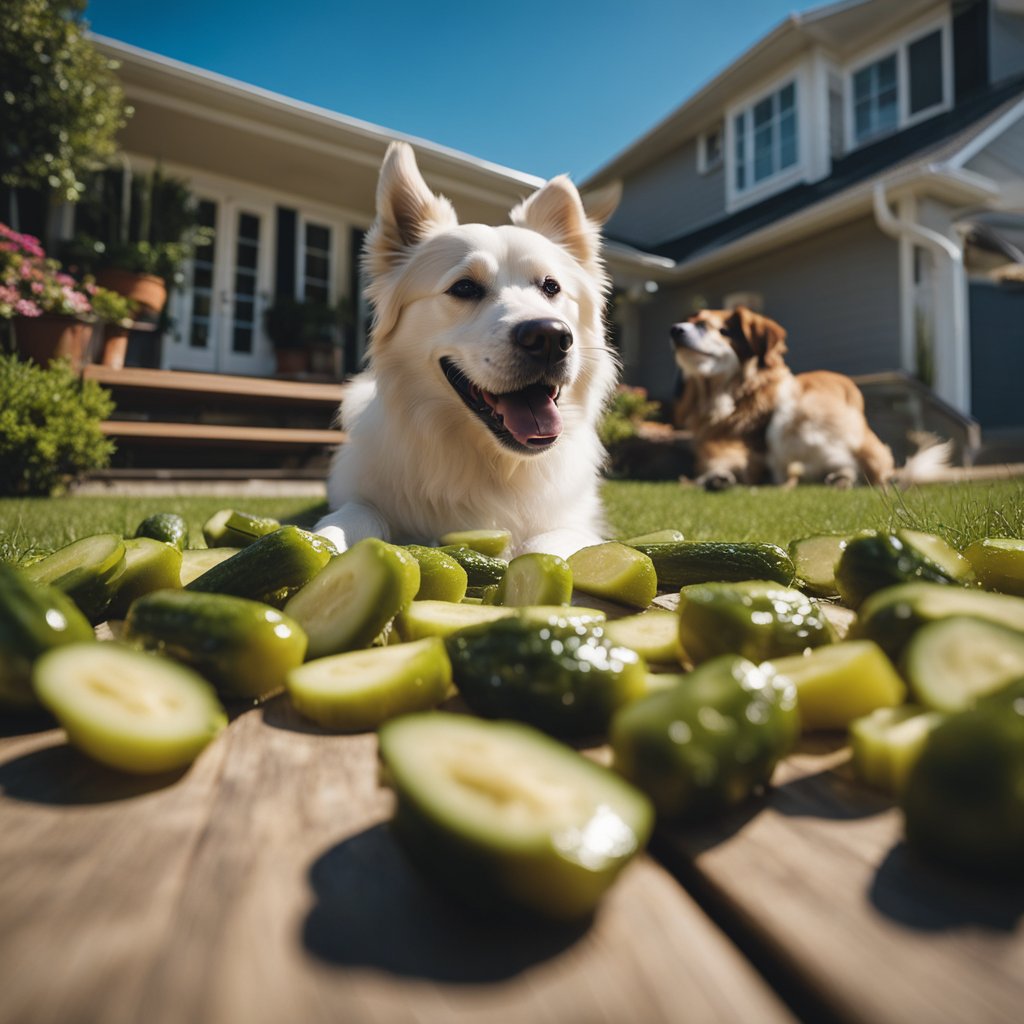Can Dogs Eat Pickles? A Comprehensive Guide to Feeding Your Canine Friend Pickles Safely
Dogs are curious creatures and they often want to eat what their owners are eating. As a dog owner, you may be wondering if it’s safe to give your furry friend pickles. While it may seem like a harmless snack, there are a few things you should know before feeding your dog pickles.
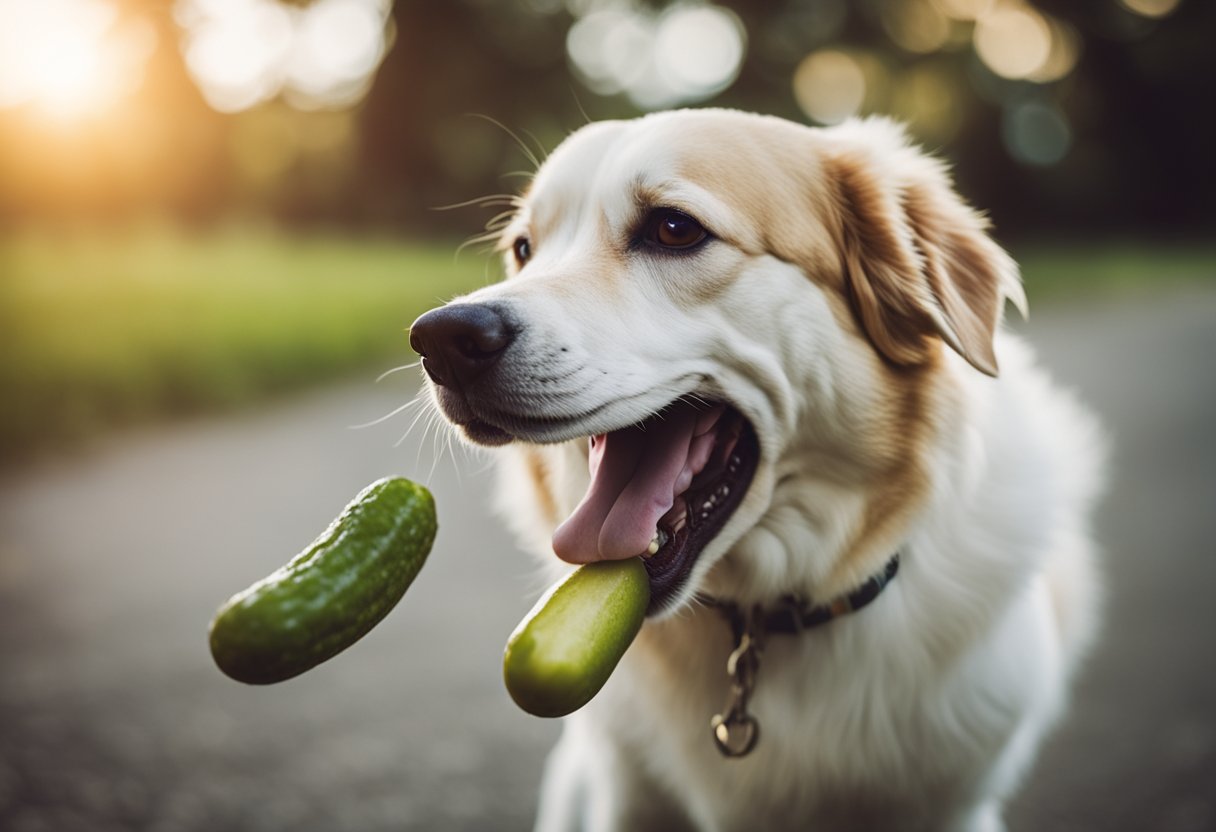
Can dogs eat pickles? The answer is not a simple yes or no. While pickles aren’t necessarily toxic for dogs, they are high in sodium and can contain harmful ingredients, such as onions and garlic. It’s important to understand the risks associated with feeding your dog pickles and to practice safe feeding practices.
Safe feeding practices include limiting the amount of pickles your dog consumes, avoiding pickles with harmful ingredients, and monitoring your dog for any adverse reactions. By following these practices, you can safely give your dog pickles as an occasional treat.
Key Takeaways
- Pickles are not toxic to dogs, but they are high in sodium and can contain harmful ingredients.
- Safe feeding practices include limiting the amount of pickles your dog consumes, avoiding pickles with harmful ingredients, and monitoring your dog for any adverse reactions.
- With proper precautions, you can safely give your dog pickles as an occasional treat.
Can Dogs Eat Pickles?
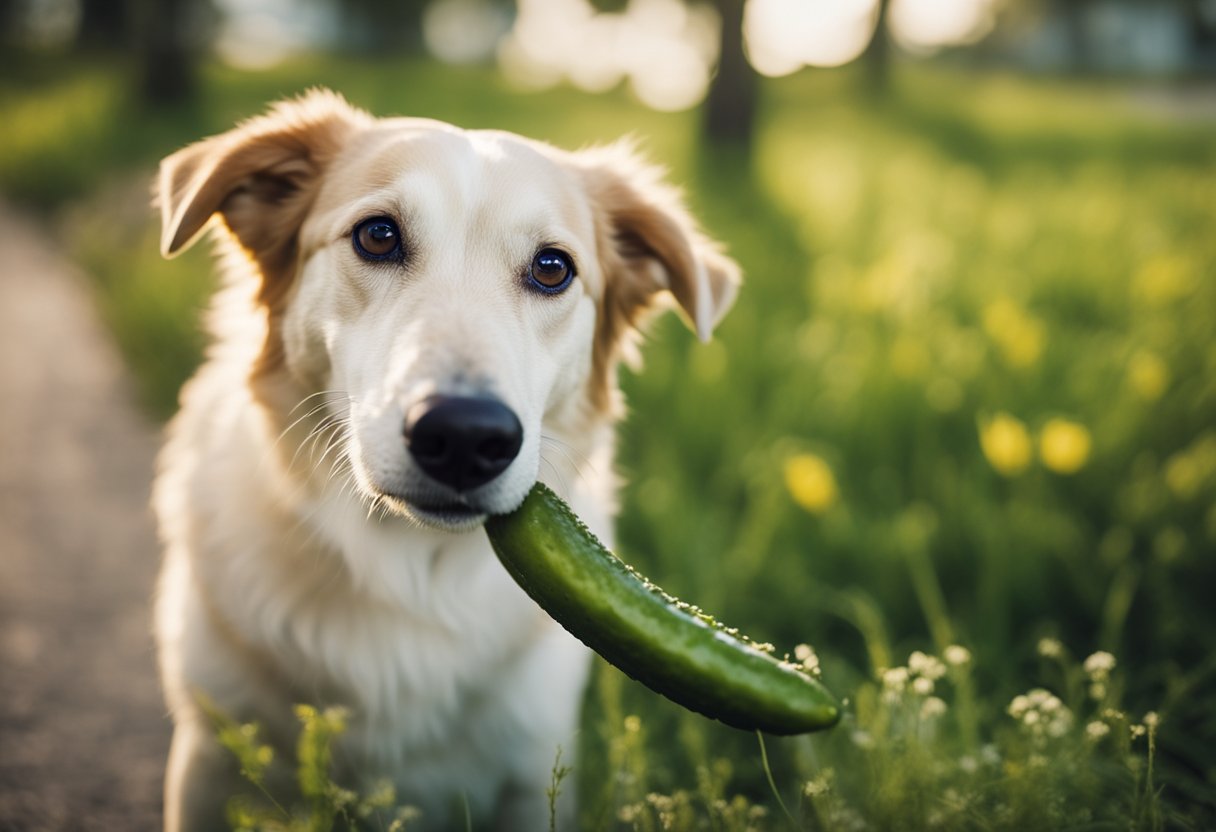
If you’re a pickle lover, you may be wondering if it’s safe to share this delicious treat with your furry friend. While pickles aren’t toxic to dogs, they may not be the best snack choice for them. Here’s what you need to know about feeding pickles to your dog.
Nutritional Content of Pickles
Pickles are made from cucumbers, which are low in calories and high in vitamins and minerals. However, the pickling process involves adding salt, vinegar, and other spices, which can significantly alter the nutritional content of the cucumber. Pickles are high in sodium, which can be harmful to dogs if consumed in large amounts. Additionally, some pickles may contain garlic, onions, or other ingredients that are toxic to dogs.
Risks of Feeding Pickles to Dogs
Feeding your dog pickles can lead to a variety of health problems. The high sodium content in pickles can cause your dog to become dehydrated, which can lead to kidney problems. Dogs who regularly eat food that is high in sodium, like pickles, can develop pancreatitis, which is an inflammation of the pancreas. The pancreas becomes incapable of functioning properly, which can lead to digestive problems and other health issues.
Some pickles may also contain garlic, onions, or other ingredients that are toxic to dogs. These ingredients can cause an upset stomach, vomiting, diarrhea, and other digestive problems. If your dog has consumed pickles that contain these ingredients, you should contact your veterinarian immediately.
In conclusion, while pickles aren’t toxic to dogs, they may not be the best snack choice for them. If you want to give your dog a treat, there are plenty of healthy options available, like fresh fruits and vegetables. As always, it’s important to talk to your veterinarian before introducing any new foods to your dog’s diet.
Safe Feeding Practices
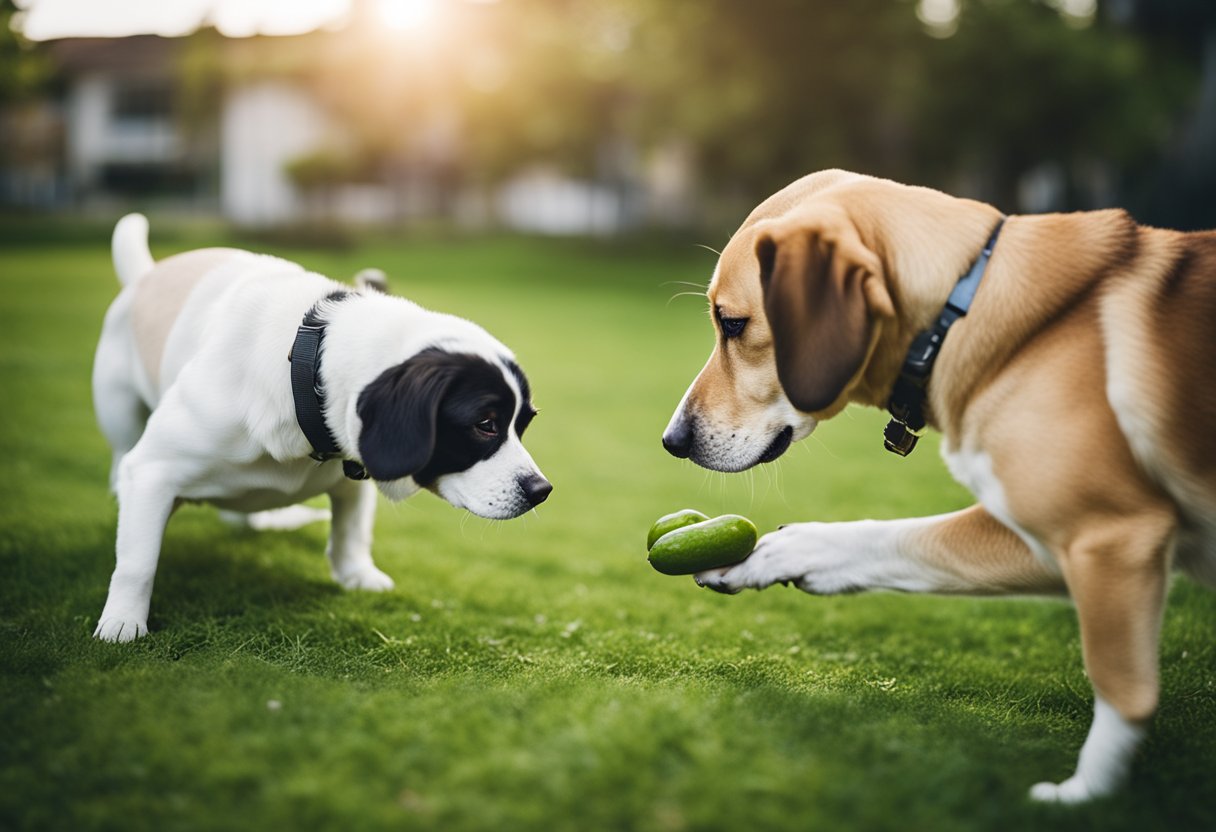
When feeding your dog pickles, it’s important to keep a few things in mind to ensure their safety and well-being. Here are some safe feeding practices to follow:
1. Moderation is Key
While pickles are generally safe for dogs to eat, they should be fed in moderation. Too many pickles can cause an upset stomach, diarrhea, or even pancreatitis. As a general rule, treats should make up no more than 10% of your dog’s daily caloric intake.
2. Avoid Certain Types of Pickles
Some types of pickles are not safe for dogs to eat. For example, pickles that contain onions, garlic, or other spices can be harmful to your dog’s health. Additionally, pickles that are high in sodium can lead to dehydration and other health issues. It’s best to stick to plain, unsalted pickles if you want to give your dog a treat.
3. Consider Making Your Own Pickles
If you’re concerned about the ingredients in store-bought pickles, consider making your own at home. This way, you can control what goes into them and ensure that they’re safe for your dog to eat. There are many recipes online for homemade pickles that are safe for dogs.
4. Always Supervise Your Dog
Whenever you give your dog a treat, it’s important to supervise them to ensure that they don’t choke or have any adverse reactions. Additionally, you should always provide your dog with plenty of fresh water to drink after they’ve eaten a treat.
By following these safe feeding practices, you can ensure that your dog can enjoy pickles as a treat without any negative consequences.
Resources
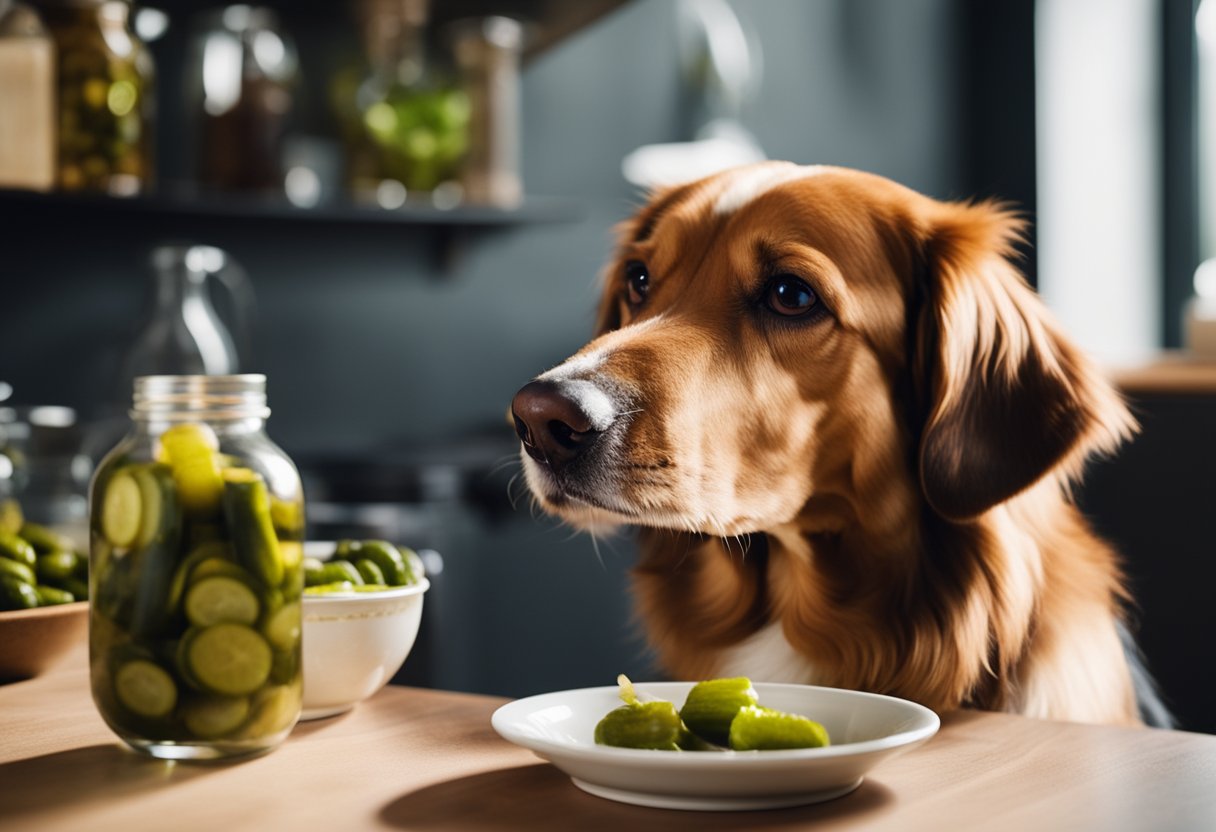
If you’re considering giving your dog pickles, it’s important to do your research first. While pickles are not toxic to dogs, they do contain a lot of salt and other ingredients that can be harmful to your furry friend. Here are some resources to help you make an informed decision:
- American Kennel Club (AKC): The AKC provides a comprehensive guide on whether dogs can eat pickles. According to the AKC, pickles are not necessarily harmful to dogs, but they should be given in moderation due to their high salt content. The article also provides tips on how to safely feed your dog pickles. AKC
- Rover: Rover’s article on whether dogs can eat pickles provides a detailed analysis of the nutritional value of pickles. According to the article, while pickles are technically safe for dogs to eat, they contain a lot of salt and other ingredients that can be harmful to your dog’s health. The article also provides tips on how to safely feed your dog pickles. Rover
- Petco: Petco’s article on whether dogs can eat pickles provides a detailed analysis of the nutritional value of pickles. According to the article, while cucumbers are safe for dogs to consume, most pickles are extremely high in sodium, and some pickles contain ingredients that can be harmful to your pup. The article also provides tips on how to safely feed your dog pickles. Petco
- Hepper: Hepper’s article on whether dogs can eat pickles provides a vet-approved safety facts and FAQ. According to the article, most store-bought pickles include lots of different spices and herbs. Some even contain hot peppers that would irritate your dog’s mouth and gastrointestinal tract. Onions are a popular pickling ingredient, but they aren’t safe for dogs, either. The article also provides tips on how to safely feed your dog pickles. Hepper
By using these resources, you can make an informed decision about whether to feed your dog pickles. Remember to always consult with your veterinarian before making any changes to your dog’s diet.
Conclusion
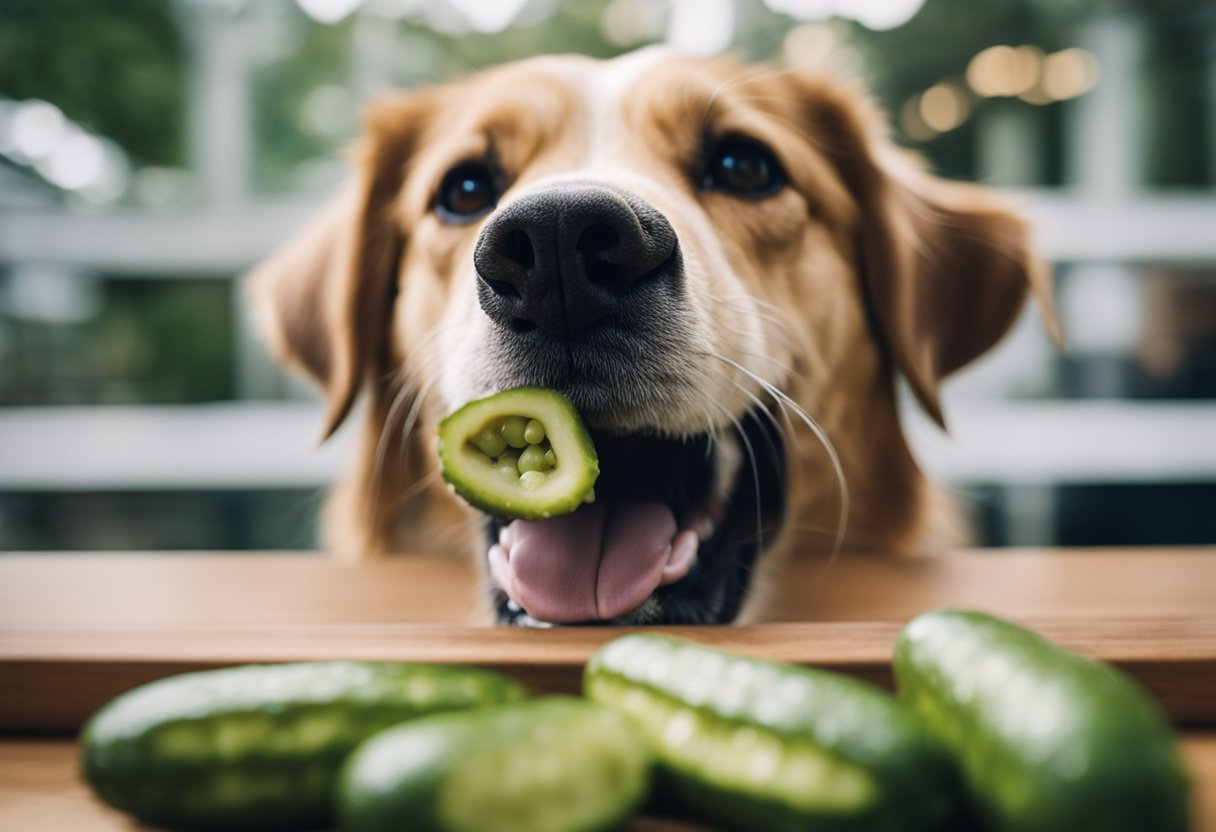
In conclusion, pickles can be a tasty and crunchy snack for dogs when given in moderation and prepared properly. It’s important to choose unsalted, low-sodium options and to monitor your dog’s sodium intake. Remember to prioritize your dog’s health and well-being and to consult with your veterinarian before introducing any new foods to their diet.
While pickles aren’t necessarily toxic to dogs, they are high in sodium, which can cause dehydration and other health problems. Most pickles are formulated with a salt-water brine, and while sodium is an essential part of a healthy dog’s diet, the sodium content in pickles is far too high. Any benefit that pickles may offer to dogs is outweighed by the potential harm caused by the excessive sodium content.
If you do decide to give your dog pickles, it’s important to do so in moderation. Too many pickles can cause digestive upset such as vomiting or diarrhea. Additionally, some pickles may contain spices that can cause stomach upset in dogs. If your dog does eat a pickle and seems to be okay, make sure to give them plenty of water to help flush out any excess sodium.
Overall, while pickles may be a tasty treat for humans, they should be given to dogs sparingly and only in moderation. As with any new food, it’s important to monitor your dog’s reaction to pickles and to consult with your veterinarian if you have any concerns about their diet or health.
Frequently Asked Questions
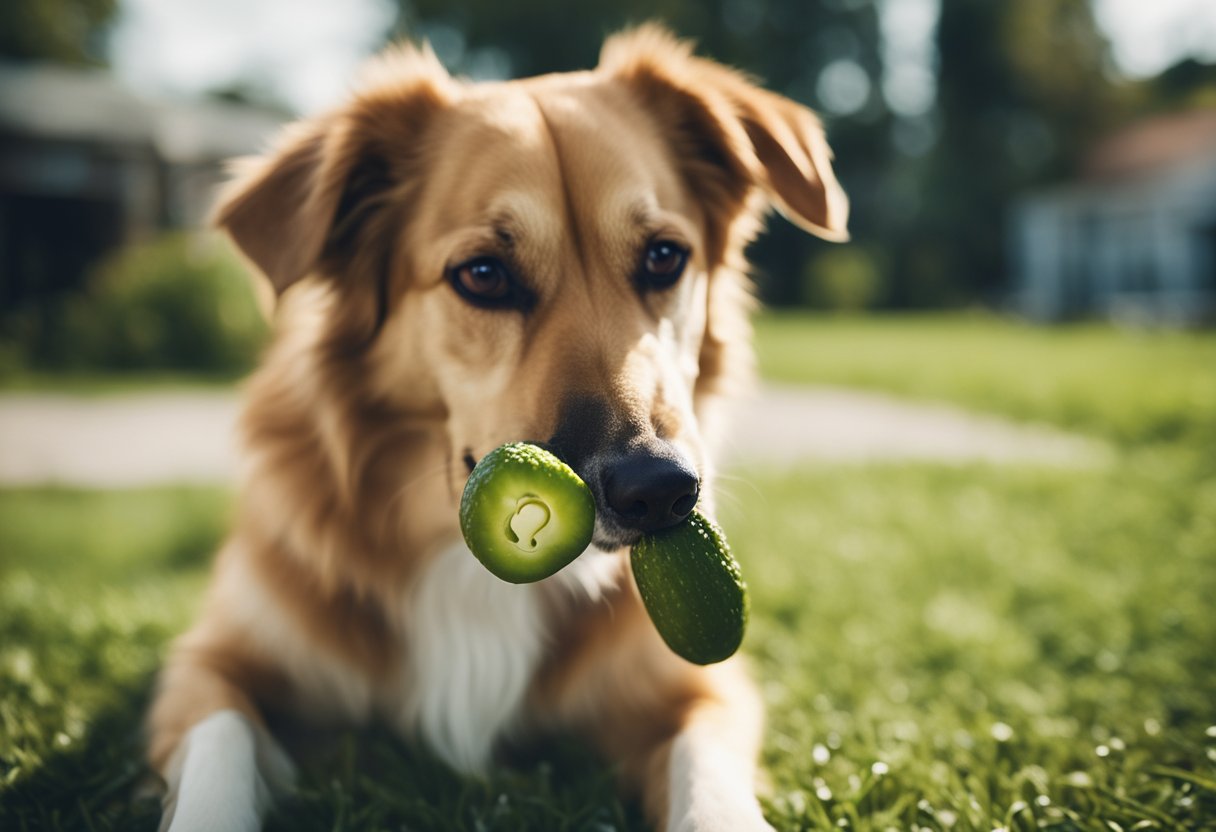
Are dill pickles safe for dogs to consume?
Dill pickles are generally safe for dogs to consume in moderation. According to the American Kennel Club, pickles are made from cucumbers, which are safe for dogs to eat. However, it’s important to note that pickles contain a lot of salt, which can be harmful to dogs if consumed in large amounts.
Is pickle juice harmful to dogs?
Pickle juice is not recommended for dogs as it can contain high levels of salt and other ingredients that may be harmful to them. According to Hepper, pickle juice can also contain vinegar, which can cause stomach upset and other digestive issues in dogs.
What are the risks of feeding my dog pickles?
The main risk associated with feeding your dog pickles is the high salt content. Consuming too much salt can lead to dehydration, electrolyte imbalances, and other health issues. Additionally, some pickles may contain other ingredients that are harmful to dogs, such as onions or garlic.
Can consuming pickles lead to health issues in dogs?
Yes, consuming pickles can lead to health issues in dogs if they are consumed in large amounts or on a regular basis. As mentioned earlier, the high salt content in pickles can lead to dehydration, electrolyte imbalances, and other health issues. Additionally, some pickles may contain other ingredients that are harmful to dogs, such as onions or garlic.
Are there any safe pickled foods for dogs to eat?
While pickles themselves are not necessarily harmful to dogs, it’s best to avoid feeding your dog any pickled foods that contain harmful ingredients such as onions or garlic. According to Betterpet, some safe pickled foods for dogs to eat include pickled vegetables that are not made with harmful ingredients, such as pickled carrots or green beans.
How does vinegar in pickles affect a dog’s health?
Vinegar in pickles is generally safe for dogs to consume in small amounts. However, consuming large amounts of vinegar can cause stomach upset and other digestive issues. Additionally, some pickles may contain other ingredients that are harmful to dogs, such as onions or garlic. Therefore, it’s important to monitor your dog’s intake of pickles and other pickled foods to ensure they are not consuming harmful ingredients.
